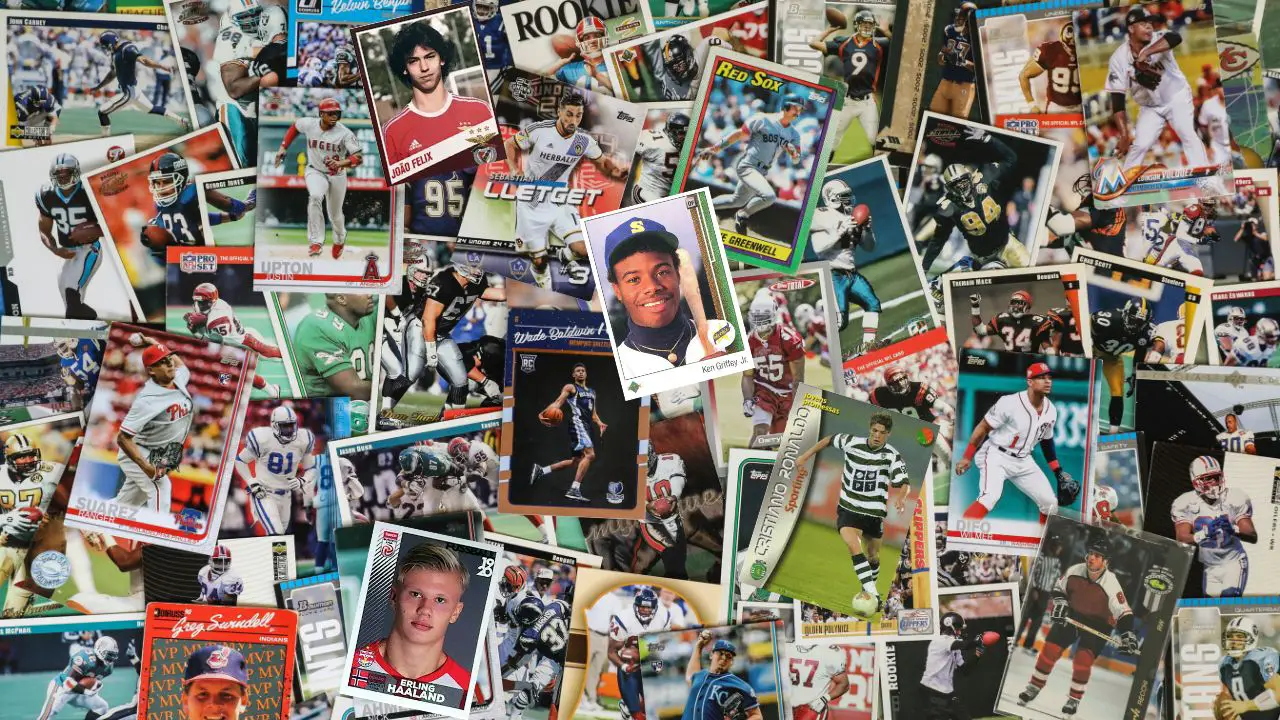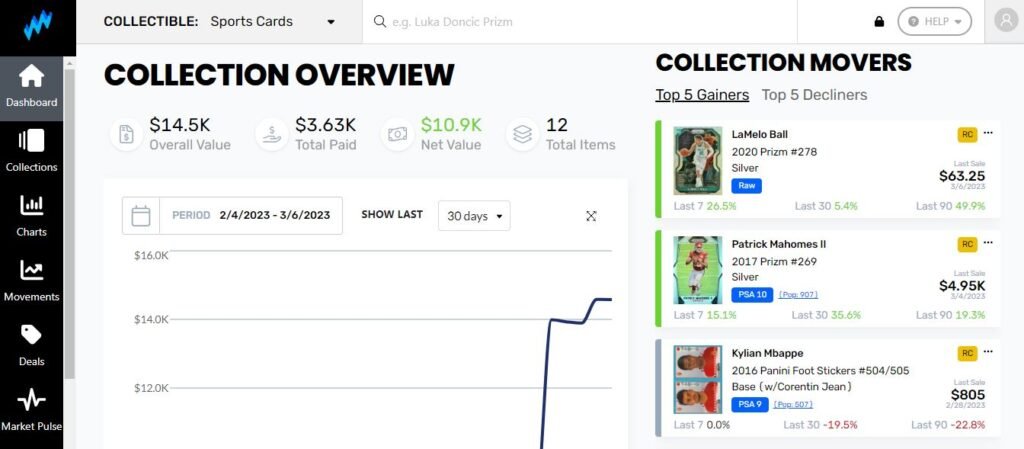
There’s a lot of potential to make money investing in sports cards, but so many do not take the time to research and educate themselves before jumping in.
As someone who has bought and sold soccer cards in particular, among some other sports, for a while now, and made mistakes along the way, I’ve been thinking about the things every new sports card investor should know before starting.
So, below is the 10 things I think everyone who is starting out buying sports cards should know.
Table of Contents
Recommended Tool:
Market Movers
There’s no better tool for sports card investors, with endless data and graphs for both the overall market, and specific cards. Track your sports card portfolio easily in one place.
Things To Know Before Investing In Sports Cards
1. Know The Sport You’re Investing In
I’d recommend only investing into sports cards of sports you know well.
Knowing the sport allows you to make more educated decisions when picking the cards you’re hoping will rise in value.
I personally focus mainly on soccer cards (or stickers); it’s the sport I’ve been watching since I was a young kid and I know more about it than any other sport.
It means I can be confident when picking a rookie who I believe has a big future or a player who’s about to have a big season.
I also know who’s popular now and likely to have high demand in the future. Of course, I won’t always get it right, you never know what is going to happen in sport.
Something that I love about sports cards is seeing whether I’m right or wrong about a player.
For example, I was wrong about Mbappe – I didn’t think he’d reach the levels he has so soon… but I was right about Haaland. Your ability to evaluate emerging talents can be a huge asset in successful sports card investing.
By not knowing the sport well before investing, you’re setting yourself up to make poor decisions with who you invest in.
2. A Card’s Value Might Drop Short Term - Don’t Panic
Supply and demand orientated markets, like sports cards, fluctuate. There will be ups and downs, and you must be able to accept that.
I’ve brought sports cards in the past that have dropped in value, only to eventually rise to much higher than I paid.
You’ll never know the exact best time to buy a card, and you’ll never know for sure the best time to sell.
It would’ve been easy to panic and sell those cards to cut further losses, but I’d done my homework and I believed the investment was good long term.
3. Do Your Research And Learn The Market
There’s so many tools that make it easy to track the sports card market these days.
eBay for example has the completed and sold items filter which is a great way to see what the latest auctions for cards finished at.
PSA also have a good tool to see the prices of their graded cards.
Many new investors will get carried away, go into gambling mode, and jump in before they’ve done their research – most of those people will lose.
As I mentioned in my last point, the market is dynamic and often changing. If you’re serious about making money in sports cards then do your research and keep up with market trends.
Making profit on sports cards is by no means an easy get rich quick scheme.
4. Keep A Record Of Your Sports Card Investments
When starting out with sports cards, something I soon found out was that I needed to keep track of my collection.
At first, I used an Excel spreadsheet to keep a record of what I had and what I paid for each card – that way I could see if I was actually making a profit, it makes life a lot easier. Once your collection grows, you won’t be able to remember it all in your head.
A tool that I use now is Market Movers. I can keep a record of my collection while seeing price trends. It has a huge database of price and volume charts.
For me personally, I see huge value in using a tool like this because of the time it saves me.
Market Movers also helps with the previous suggestion of learning the market – It has plenty of up-to-date data and graphs of both specific cards and the overall market, to help do that.
If it’s a tool you’re interested in, you can get a free 7-day trial using the code: TRIAL
5. Look For Rarity And Scarcity
A big factor in a sports card’s value is the amount of supply it has.
Card manufacturers have created scarcity of supply with limited/numbered cards in recent years (for example the Topps UCL living set). Also, the highest grade of cards may have a low population count.
A rise in value comes from demand outweighing supply.
Before you make an investment, think about the rarity or scarcity of what you’re buying – the rarer a card, the more chance it has of rising in value in the future.
6. Favour Rookie Cards
Something that I’ve learned is that a player’s rookie card will usually always hold the most value.
This goes back to the scarcity point – a player will only ever have one 1st season and because they’re unproven or even relatively unknown at the time, there isn’t usually a huge supply of their cards. Rookie cards will always be sought after by collectors and their rarity makes them more valuable.
If you believe an emerging player is going to end up dominating the sport, it’s best to buy their rookie card early, as that will have the most chance of rising in value.
7. Buy The Right Type Of Player Card
Collectors want the players that excite them – think attackers in soccer, quarterbacks in football and shooters in basketball.
Again, value comes from high demand and people want the most popular ‘highlight-reel’ players.
It’s worth considering a player’s position before investing in their card, less ‘exciting’ positions are generally limited in their potential for growth in value.
8. Accept That Not Every Investment Will Rise In Value
Not every sports card you buy will rise in value, you will lose some.
The risk of that is minimized if you’re sticking to buying the hall of famers and icons of the sport, but there will be the occasional card that doesn’t go as planned.
As I mentioned earlier, anything can happen in sport. The next big star is one potential injury away from having a different than expected career – you might have brought his rookie card with the expectation he’ll go on and dominate the sport.
It’s important to remember that nothing is guaranteed in the sports card market.
9. Raw vs Graded
Graded cards are safer to buy; You know exactly what condition it’s in, because it’s been authenticated and analyzed by a 3rd party professional, and it’ll be encased in a protective plastic case.
Because of this, and also because they’re more scarce, they’re more valuable than raw cards. You can check a population report for graded cards to see how rare they are.
Obviously, the higher graded the card, the more valuable it will be amongst collectors but even a lower graded card holds more value than a raw card in a lot of cases.
I personally deal mainly with graded cards but If you spend time to know what you’re looking for and you’re able to accurately predict a raw sports card’s potential grade then there’s profit to be made – It’s a great potential card flipping strategy.
10. Make Sure You Know What You’re Buying
It’s important to know exactly what you’re buying when you invest in a sports card.
If we take eBay as an example – people these days will try little tricks with their listings. Often I see people only disclosing damage to the sports card in small text within the description, while from the images and title of the listing, you wouldn’t know.
Sellers may also include a potential grade for the card, such as ‘PSA 9?’, in the listing title or description – meaning it hasn’t been professionally graded a 9, it’s what the seller is suggesting it could be. I would always take that with a pinch of salt, the seller will want the best price they can get for the card, so make your own judgement.
It’s easy to overpay on raw sports cards, in particular, if you don’t take time to fully understand the condition of the card you’re buying – make sure you read all the information you have available to you.
Is Sports Card Investing Profitable?
Sports cards can definitely be profitable – It’s all about having a strategy and making the right picks, as it is with traditional stock investing.
Properly researching and learning the market, as well as using the multiple online tools and resources available, maximizes the chance of making profit.
Can Sports Cards Lose Value?
Yes, sports cards can lose value, just like any asset.
All asset markets see peaks and troughs, and it’s no different to the sports card market. Player performance and status also affect the value of their cards, and sport is often unpredictable.
There are often more opportunities when prices are down, to buy for less and see bigger returns in the future, similar to the stock market.
Is It Worth It To Invest In Sports Cards?
As long as you take the time to educate and learn, sports card investing can be lucrative, and well worth doing.
Sports cards, and other collectibles, offer a great portfolio diversification option with investing.
The best sports card investors can generate far higher returns than something like an S&P 500 index fund, but you have to know what you’re doing, and understand there’s always a level of risk to your capital – As with any investment, only invest money you can afford to lose in the worst case scenario.


